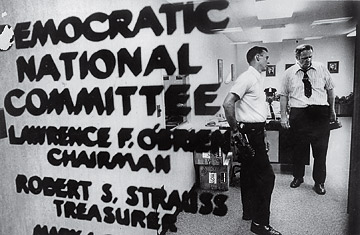
Police investigate the DNC headquarters at Watergate Hotel following the June 1972 burglary.
Every day, Hundreds of millions of people chat, exchange messages and send images via social-networking sites like Facebook and mobile devices like the BlackBerry. Unfortunately for security officials, those users include criminals and suspected terrorists. So it wasn't altogether surprising when, on Sept. 27, it emerged that the Obama Administration plans to submit a bill to Congress next year that could force communications firms--including giants like Facebook and Skype--to ensure that they have the technical know-how to intercept and unscramble messages if asked to do so by officials.
Wiretapping first became a tool of U.S. law enforcement in the 1890s, but the Supreme Court didn't establish its constitutionality until 1928, at the height of Prohibition. Roy Olmstead, a Seattle bootlegger, had been convicted on evidence gathered through a wiretap in his home. He argued that authorities had violated his rights--but the court upheld his conviction, saying eavesdropping was not a physical invasion of privacy. In 1963, U.S. Attorney General Robert Kennedy authorized the FBI to break into the home and office of the Rev. Martin Luther King Jr. The agency planted bugs, assuming they would unearth King's rumored links to communists, but removed them in 1966. Richard Nixon approved the illegal wiretapping of four reporters and 13 government officials in 1969 in a bid to unmask those leaking information to the press. And in 1972 a grand jury indicted two Nixon aides for the burglary and illegal wiretapping of the Democratic National Committee headquarters at the Watergate Hotel.
FBI officials have said that Obama's proposal won't expand their authority: any intercepts would need legal approval. Privacy advocates may shriek, but as criminals turn to new technologies, those in law enforcement may have greater license to tap into our now wireless lives.
